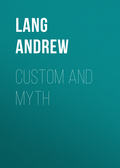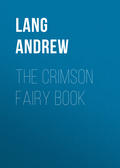
Lang Andrew
The Orange Fairy Book
The Foolish Weaver
[Adapted from Thorpe’s Yule-Tide Stories.]
Once a weaver, who was in want of work, took service with a certain farmer as a shepherd.
The farmer, knowing that the man was very slow-witted, gave him most careful instructions as to everything that he was to do.
Finally he said: ‘If a wolf or any wild animal attempts to hurt the flock you should pick up a big stone like this’ (suiting the action to the word) ‘and throw a few such at him, and he will be afraid and go away.’ The weaver said that he understood, and started with the flocks to the hillsides where they grazed all day.
By chance in the afternoon a leopard appeared, and the weaver instantly ran home as fast as he could to get the stones which the farmer had shown him, to throw at the creature. When he came back all the flock were scattered or killed, and when the farmer heard the tale he beat him soundly. ‘Were there no stones on the hillside that you should run back to get them, you senseless one?’ he cried; ‘you are not fit to herd sheep. To-day you shall stay at home and mind my old mother who is sick, perhaps you will be able to drive flies off her face, if you can’t drive beasts away from sheep!’
So, the next day, the weaver was left at home to take care of the farmer’s old sick mother. Now as she lay outside on a bed, it turned out that the flies became very troublesome, and the weaver looked round for something to drive them away with; and as he had been told to pick up the nearest stone to drive the beasts away from the flock, he thought he would this time show how cleverly he could obey orders. Accordingly he seized the nearest stone, which was a big, heavy one, and dashed it at the flies; but, unhappily, he slew the poor old woman also; and then, being afraid of the wrath of the farmer, he fled and was not seen again in that neighbourhood.
All that day and all the next night he walked, and at length he came to a village where a great many weavers lived together.
‘You are welcome,’ said they. ‘Eat and sleep, for to-morrow six of us start in search of fresh wool to weave, and we pray you to give us your company.’
‘Willingly,’ answered the weaver. So the next morning the seven weavers set out to go to the village where they could buy what they wanted. On the way they had to cross a ravine which lately had been full of water, but now was quite dry. The weavers, however, were accustomed to swim over this ravine; therefore, regardless of the fact that this time it was dry, they stripped, and, tying their clothes on their heads, they proceeded to swim across the dry sand and rocks that formed the bed of the ravine. Thus they got to the other side without further damage than bruised knees and elbows, and as soon as they were over, one of them began to count the party to make sure that all were safe there. He counted all except himself, and then cried out that somebody was missing! This set each of them counting; but each made the same mistake of counting all except himself, so that they became certain that one of their party was missing! They ran up and down the bank of the ravine wringing their hands in great distress and looking for signs of their lost comrade. There a farmer found them and asked what was the matter. ‘Alas!’ said one, ‘seven of us started from the other bank and one must have been drowned on the crossing, as we can only find six remaining!’ The farmer eyed them a minute, and then, picking up his stick, he dealt each a sounding blow, counting, as he did so, ‘One! two! three!’ and so on up to the seven. When the weavers found that there were seven of them they were overcome with gratitude to one whom they took for a magician as he could thus make seven out of an obvious six.
The Clever Cat
[From the Pushto.]
Once upon a time there lived an old man who dwelt with his son in a small hut on the edge of the plain. He was very old, and had worked very hard, and when at last he was struck down by illness he felt that he should never rise from his bed again.
So, one day, he bade his wife summon their son, when he came back from his journey to the nearest town, where he had been to buy bread.
‘Come hither, my son,’ said he; ‘I know myself well to be dying, and I have nothing to leave you but my falcon, my cat and my greyhound; but if you make good use of them you will never lack food. Be good to your mother, as you have been to me. And now farewell!’
Then he turned his face to the wall and died.
There was great mourning in the hut for many days, but at length the son rose up, and calling to his greyhound, his cat and his falcon, he left the house saying that he would bring back something for dinner. Wandering over the plain, he noticed a troop of gazelles, and pointed to his greyhound to give chase. The dog soon brought down a fine fat beast, and slinging it over his shoulders, the young man turned homewards. On the way, however, he passed a pond, and as he approached a cloud of birds flew into the air. Shaking his wrist, the falcon seated on it darted into the air, and swooped down upon the quarry he had marked, which fell dead to the ground. The young man picked it up, and put it in his pouch and then went towards home again.
Near the hut was a small barn in which he kept the produce of the little patch of corn, which grew close to the garden. Here a rat ran out almost under his feet, followed by another and another; but quick as thought the cat was upon them and not one escaped her.
When all the rats were killed, the young man left the barn. He took the path leading to the door of the hut, but stopped on feeling a hand laid on his shoulder.
‘Young man,’ said the ogre (for such was the stranger), ‘you have been a good son, and you deserve the piece of luck which has befallen you this day. Come with me to that shining lake yonder, and fear nothing.’
Wondering a little at what might be going to happen to him, the youth did as the ogre bade him, and when they reached the shore of the lake, the ogre turned and said to him:
‘Step into the water and shut your eyes! You will find yourself sinking slowly to the bottom; but take courage, all will go well. Only bring up as much silver as you can carry, and we will divide it between us.’
So the young man stepped bravely into the lake, and felt himself sinking, sinking, till he reached firm ground at last. In front of him lay four heaps of silver, and in the midst of them a curious white shining stone, marked over with strange characters, such as he had never seen before. He picked it up in order to examine it more closely, and as he held it the stone spoke.
‘As long as you hold me, all your wishes will come true,’ it said. ‘But hide me in your turban, and then call to the ogre that you are ready to come up.’
In a few minutes the young man stood again by the shores of the lake.
‘Well, where is the silver?’ asked the ogre, who was awaiting him.
‘Ah, my father, how can I tell you! So bewildered was I, and so dazzled with the splendours of everything I saw, that I stood like a statue, unable to move. Then hearing steps approaching I got frightened, and called to you, as you know.’
‘You are no better than the rest,’ cried the ogre, and turned away in a rage.
When he was out of sight the young man took the stone from his turban and looked at it. ‘I want the finest camel that can be found, and the most splendid garments,’ said he.
‘Shut your eyes then,’ replied the stone. And he shut them; and when he opened them again the camel that he had wished for was standing before him, while the festal robes of a desert prince hung from his shoulders. Mounting the camel, he whistled the falcon to his wrist, and, followed by his greyhound and his cat, he started homewards.
His mother was sewing at her door when this magnificent stranger rode up, and, filled with surprise, she bowed low before him.
‘Don’t you know me, mother?’ he said with a laugh. And on hearing his voice the good woman nearly fell to the ground with astonishment.
‘How have you got that camel and those clothes?’ asked she. ‘Can a son of mine have committed murder in order to possess them?’
‘Do not be afraid; they are quite honestly come by,’ answered the youth. ‘I will explain all by-and-by; but now you must go to the palace and tell the king I wish to marry his daughter.’
At these words the mother thought her son had certainly gone mad, and stared blankly at him. The young man guessed what was in her heart, and replied with a smile:
‘Fear nothing. Promise all that he asks; it will be fulfilled somehow.’
So she went to the palace, where she found the king sitting in the Hall of Justice listening to the petitions of his people. The woman waited until all had been heard and the hall was empty, and then went up and knelt before the throne.
‘My son has sent me to ask for the hand of the princess,’ said she.
The king looked at her and thought that she was mad; but, instead of ordering his guards to turn her out, he answered gravely:
‘Before he can marry the princess he must build me a palace of ice, which can be warmed with fires, and wherein the rarest singing-birds can live!’
‘It shall be done, your Majesty,’ said she, and got up and left the hall.
Her son was anxiously awaiting her outside the palace gates, dressed in the clothes that he wore every day.
‘Well, what have I got to do?’ he asked impatiently, drawing his mother aside so that no one could overhear them.
‘Oh, something quite impossible; and I hope you will put the princess out of your head,’ she replied.
‘Well, but what is it?’ persisted he.
‘Nothing but to build a palace of ice wherein fires can burn that shall keep it so warm that the most delicate singing-birds can live in it!’
‘I thought it would be something much harder than that,’ exclaimed the young man. ‘I will see about it at once.’ And leaving his mother, he went into the country and took the stone from his turban.
‘I want a palace of ice that can be warmed with fires and filled with the rarest singing-birds!’
‘Shut your eyes, then,’ said the stone; and he shut them, and when he opened them again there was the palace, more beautiful than anything he could have imagined, the fires throwing a soft pink glow over the ice.
‘It is fit even for the princess,’ thought he to himself.
As soon as the king awoke next morning he ran to the window, and there across the plain he beheld the palace.
‘That young man must be a great wizard; he may be useful to me.’ And when the mother came again to tell him that his orders had been fulfilled he received her with great honour, and bade her tell her son that the wedding was fixed for the following day.
The princess was delighted with her new home, and with her husband also; and several days slipped happily by, spent in turning over all the beautiful things that the palace contained. But at length the young man grew tired of always staying inside walls, and he told his wife that the next day he must leave her for a few hours, and go out hunting. ‘You will not mind?’ he asked. And she answered as became a good wife:
‘Yes, of course I shall mind; but I will spend the day in planning out some new dresses; and then it will be so delightful when you come back, you know!’
So the husband went off to hunt, with the falcon on his wrist, and the greyhound and the cat behind him – for the palace was so warm that even the cat did not mind living in it.
No sooner had he gone, than the ogre who had been watching his chance for many days, knocked at the door of the palace.
‘I have just returned from a far country,’ he said, ‘and I have some of the largest and most brilliant stones in the world with me. The princess is known to love beautiful things, perhaps she might like to buy some?’
Now the princess had been wondering for many days what trimming she should put on her dresses, so that they should outshine the dresses of the other ladies at the court balls. Nothing that she thought of seemed good enough, so, when the message was brought that the ogre and his wares were below, she at once ordered that he should be brought to her chamber.
Oh! what beautiful stones he laid before her; what lovely rubies, and what rare pearls! No other lady would have jewels like those – of that the princess was quite sure; but she cast down her eyes so that the ogre might not see how much she longed for them.
‘I fear they are too costly for me,’ she said carelessly; ‘and besides, I have hardly need of any more jewels just now.’
‘I have no particular wish to sell them myself,’ answered the ogre, with equal indifference. ‘But I have a necklace of shining stones which was left me by father, and one, the largest engraven with weird characters, is missing. I have heard that it is in your husband’s possession, and if you can get me that stone you shall have any of these jewels that you choose. But you will have to pretend that you want it for yourself; and, above all, do not mention me, for he sets great store by it, and would never part with it to a stranger! To-morrow I will return with some jewels yet finer than those I have with me to-day. So, madam, farewell!’
Left alone, the princess began to think of many things, but chiefly as to whether she would persuade her husband to give her the stone or not. At one moment she felt he had already bestowed so much upon her that it was a shame to ask for the only object he had kept back. No, it would be mean; she could not do it! But then, those diamonds, and those string of pearls! After all, they had only been married a week, and the pleasure of giving it to her ought to be far greater than the pleasure of keeping it for himself. And she was sure it would be!
Well, that evening, when the young man had supped off his favourite dishes which the princess took care to have specially prepared for him, she sat down close beside him, and began stroking his head. For some time she did not speak, but listened attentively to all the adventures that had befallen him that day.
‘But I was thinking of you all the time,’ said he at the end, ‘and wishing that I could bring you back something you would like. But, alas! what is there that you do not possess already?’
‘How good of you not to forget me when you are in the midst of such dangers and hardships,’ answered she. ‘Yes, it is true I have many beautiful things; but if you want to give me a present – and to-morrow is my birthday – there IS one thing that I wish for very much.’
‘And what is that? Of course you shall have it directly!’ he asked eagerly.
‘It is that bright stone which fell out of the folds of your turban a few days ago,’ she answered, playing with his finger; ‘the little stone with all those funny marks upon it. I never saw any stone like it before.’
The young man did not answer at first; then he said, slowly:
‘I have promised, and therefore I must perform. But will you swear never to part from it, and to keep it safely about you always? More I cannot tell you, but I beg you earnestly to take heed to this.’
The princess was a little startled by his manner, and began to be sorry that she had every listened to the ogre. But she did not like to draw back, and pretended to be immensely delighted at her new toy, and kissed and thanked her husband for it.
‘After all I needn’t give it to the ogre,’ thought she as she dropped off to sleep.
Unluckily the next morning the young man went hunting again, and the ogre, who was watching, knew this, and did not come till much later than before. At the moment that he knocked at the door of the palace the princess had tired of all her employments, and her attendants were at their wits’ end how to amuse her, when a tall negro dressed in scarlet came to announce that the ogre was below, and desired to know if the princess would speak to him.
‘Bring him hither at once!’ cried she, springing up from her cushions, and forgetting all her resolves of the previous night. In another moment she was bending with rapture over the glittering gems.
‘Have you got it?’ asked the ogre in a whisper, for the princess’s ladies were standing as near as they dared to catch a glimpse of the beautiful jewels.
‘Yes, here,’ she answered, slipping the stone from her sash and placing it among the rest. Then she raised her voice, and began to talk quickly of the prices of the chains and necklaces, and after some bargaining, to deceive the attendants, she declared that she liked one string of pearls better than all the rest, and that the ogre might take away the other things, which were not half as valuable as he supposed.
‘As you please, madam,’ said he, bowing himself out of the palace.
Soon after he had gone a curious thing happened. The princess carelessly touched the wall of her room, which was wont to reflect the warm red light of the fire on the hearth, and found her hand quite wet. She turned round, and – was it her fancy? or did the fire burn more dimly than before? Hurriedly she passed into the picture gallery, where pools of water showed here and there on the floor, and a cold chill ran through her whole body. At that instant her frightened ladies came running down the stairs, crying:
‘Madam! madam! what has happened? The palace is disappearing under our eyes!’
‘My husband will be home very soon,’ answered the princess – who, though nearly as much frightened as her ladies, felt that she must set them a good example. ‘Wait till then, and he will tell us what to do.’
So they waited, seated on the highest chairs they could find, wrapped in their warmest garments, and with piles of cushions under their feet, while the poor birds flew with numbed wings hither and thither, till they were so lucky as to discover an open window in some forgotten corner. Through this they vanished, and were seen no more.
At last, when the princess and her ladies had been forced to leave the upper rooms, where the walls and floors had melted away, and to take refuge in the hall, the young man came home. He had ridden back along a winding road from which he did not see the palace till he was close upon it, and stood horrified at the spectacle before him. He knew in an instant that his wife must have betrayed his trust, but he would not reproach her, as she must be suffering enough already. Hurrying on he sprang over all that was left of the palace walls, and the princess gave a cry of relief at the sight of him.
‘Come quickly,’ he said, ‘or you will be frozen to death!’ And a dreary little procession set out for the king’s palace, the greyhound and the cat bringing up the rear.
At the gates he left them, though his wife besought him to allow her to enter.
‘You have betrayed me and ruined me,’ he said sternly; ‘I go to seek my fortune alone.’ And without another word he turned and left her.
With his falcon on his wrist, and his greyhound and cat behind him, the young man walked a long way, inquiring of everyone he met whether they had seen his enemy the ogre. But nobody had. Then he bade his falcon fly up into the sky – up, up, and up – and try if his sharp eyes could discover the old thief. The bird had to go so high that he did not return for some hours; but he told his master that the ogre was lying asleep in a splendid palace in a far country on the shores of the sea. This was delightful news to the young man, who instantly bought some meat for the falcon, bidding him make a good meal.
‘To-morrow,’ said he, ‘you will fly to the palace where the ogre lies, and while he is asleep you will search all about him for a stone on which is engraved strange signs; this you will bring to me. In three days I shall expect you back here.’
‘Well, I must take the cat with me,’ answered the bird.
The sun had not yet risen before the falcon soared high into the air, the cat seated on his back, with his paws tightly clasping the bird’s neck.
‘You had better shut your eyes or you may get giddy,’ said the bird; and the cat, you had never before been off the ground except to climb a tree, did as she was bid.
All that day and all that night they flew, and in the morning they saw the ogre’s palace lying beneath them.
‘Dear me,’ said the cat, opening her eyes for the first time, ‘that looks to me very like a rat city down there, let us go down to it; they may be able to help us.’ So they alighted in some bushes in the heart of the rat city. The falcon remained where he was, but the cat lay down outside the principal gate, causing terrible excitement among the rats.
At length, seeing she did not move, one bolder than the rest put its head out of an upper window of the castle, and said, in a trembling voice:
‘Why have you come here? What do you want? If it is anything in our power, tell us, and we will do it.’
‘If you would have let me speak to you before, I would have told you that I come as a friend,’ replied the cat; ‘and I shall be greatly obliged if you would send four of the strongest and cunningest among you, to do me a service.’
‘Oh, we shall be delighted,’ answered the rat, much relieved. ‘But if you will inform me what it is you wish them to do I shall be better able to judge who is most fitted for the post.’
‘I thank you,’ said the cat. ‘Well, what they have to do is this: To-night they must burrow under the walls of the castle and go up to the room were an ogre lies asleep. Somewhere about him he has hidden a stone, on which are engraved strange signs. When they have found it they must take it from him without his waking, and bring it to me.’
‘Your orders shall be obeyed,’ replied the rat. And he went out to give his instructions.
About midnight the cat, who was still sleeping before the gate, was awakened by some water flung at her by the head rat, who could not make up his mind to open the doors.
‘Here is the stone you wanted,’ said he, when the cat started up with a loud mew; ‘if you will hold up your paws I will drop it down.’ And so he did. ‘And now farewell,’ continued the rat; ‘you have a long way to go, and will do well to start before daybreak.’
‘Your counsel is good,’ replied the cat, smiling to itself; and putting the stone in her mouth she went off to seek the falcon.
Now all this time neither the cat nor the falcon had had any food, and the falcon soon got tired carrying such a heavy burden. When night arrived he declared he could go no further, but would spend it on the banks of a river.
‘And it is my turn to take care of the stone,’ said he, ‘or it will seem as if you had done everything and I nothing.’
‘No, I got it, and I will keep it,’ answered the cat, who was tired and cross; and they began a fine quarrel. But, unluckily, in the midst of it, the cat raised her voice, and the stone fell into the ear of a big fish which happened to be swimming by, and though both the cat and the falcon sprang into the water after it, they were too late.
Half drowned, and more than half choked, the two faithful servants scrambled back to land again. The falcon flew to a tree and spread his wings in the sun to dry, but the cat, after giving herself a good shake, began to scratch up the sandy banks and to throw the bits into the stream.
‘What are you doing that for?’ asked a little fish. ‘Do you know that you are making the water quite muddy?’
‘That doesn’t matter at all to me,’ answered the cat. ‘I am going to fill up all the river, so that the fishes may die.’
‘That is very unkind, as we have never done you any harm,’ replied the fish. ‘Why are you so angry with us?’
‘Because one of you has got a stone of mine – a stone with strange signs upon it – which dropped into the water. If you will promise to get it back for me, why, perhaps I will leave your river alone.’
‘I will certainly try,’ answered the fish in a great hurry; ‘but you must have a little patience, as it may not be an easy task.’ And in an instant his scales might be seen flashing quickly along.
The fish swam as fast as he could to the sea, which was not far distant, and calling together all his relations who lived in the neighbourhood, he told them of the terrible danger which threatened the dwellers in the river.
‘None of us has got it,’ said the fishes, shaking their heads; ‘but in the bay yonder there is a tunny who, although he is so old, always goes everywhere. He will be able to tell you about it, if anyone can.’ So the little fish swam off to the tunny, and again related his story.
‘Why I was up that river only a few hours ago!’ cried the tunny; ‘and as I was coming back something fell into my ear, and there it is still, for I went to sleep, when I got home and forgot all about it. Perhaps it may be what you want.’ And stretching up his tail he whisked out the stone.
‘Yes, I think that must be it,’ said the fish with joy. And taking the stone in his mouth he carried it to the place where the cat was waiting for him.
‘I am much obliged to you,’ said the cat, as the fish laid the stone on the sand, ‘and to reward you, I will let your river alone.’ And she mounted the falcon’s back, and they flew to their master.
Ah, how glad he was to see them again with the magic stone in their possession. In a moment he had wished for a palace, but this time it was of green marble; and then he wished for the princess and her ladies to occupy it. And there they lived for many years, and when the old king died the princess’s husband reigned in his stead.






